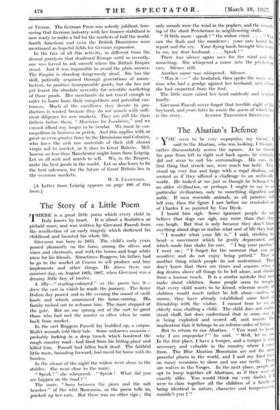The Story of a Little Poem
THERE is a great little poem which every child in Italy knows by heart. It is about a fleabitten or piebald mare, and was written by Giovanni Pascoli from the recollection of an early tragedy which darkened his childhood and haunted his whole life.
Giovanni was born in 1855. The child's early years passed pleasantly on the farm, among the olives and vines and chestnuts, and with the horses and huge white oxen for his friends. Sometimes Ruggero, his father, had to go to the market at Cesena to sell produce and buy implements and other things. He drove there one summer day, on August 10th, 1867, when Giovanni was a dreamy little boy of twelve.
A filly—" starling-coloured " as the poem has it— drew the cart in which he made the journey. The fierce Italian day passed • and in the evening the sound of swift hoofs and wheels announced the home-coming. His family rushed out to welcome him. The mare stopped at the gate. But no one sprang out of the cart to greet those who had met the master so often when lie came- back from market.
In the cart Ruggero Pascoli lay huddled up, a corpse. Bullet wounds told their tale. Some unknown assassin— probably lurking in a deep trench which bordered the rough country road‘—had fired from his hiding-place and killed him. Pascoli had fallen back dead. The faithful little mare, bounding forward, had raced for home with its burden.
In the silence of the night the widow went alone to the stables. She went close to the mare. • " Speak ! " she whispered. •• " Speak ! What did you see happen on the road ? " -- • • The mare, " born between the pines and the salt- beaches " of the wild Maremma, as the poem tells us, pricked up her ears. But there' was no other sign ; the only sounds were the wind in the poplars, and the munch- ing of the stout Percherons in neighbouring stalls.
" 0 little mare—speak ! " the widow cried. . . . " You saw the flash and the murderer ; your ears heard the report and the cry. Your flying hoofs brought him Inane to me, my dear husband. . . . Speak ! "
There was silence again save for the Wind and the munching. She whispered a name into the pricked-up ears. Silence still.
Another name was whispered. Silence.
" Was it " she hesitated, then spoke the Paine of man who had a grudge against her husband, and sylinin she had suspected from the first.
The little mare raised her head suddenly and neighed loudly.
Giovanni Pascoli never forgot that terrible night of his boyhood, and yearS- later he wrote the poem of which this






























































 Previous page
Previous page